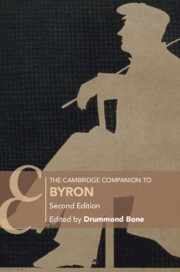Book contents
- The Cambridge Companion to Byron
- The Cambridge Companion to Byron
- Copyright page
- Contents
- Notes on Contributors
- Preface
- Chronology
- Abbreviations
- Chapter 1 Byron’s Life and His Biographers
- Chapter 2 ‘My Pen Is at the Bottom of a Page’
- Chapter 3 Byron’s Politics
- Chapter 4 Byron: Gender and Sexuality
- Chapter 5 Heroism and History
- Chapter 6 Byron and the Eastern Mediterranean
- Chapter 7 1816–1817: Childe HaroldIII and Manfred
- Chapter 8 Byron and the Theatre
- Chapter 9 Byron’s Experiments in Drama: 1820–1822
- Chapter 10 Childe Harold’s Pilgrimage iv, Don Juan, and Beppo
- Chapter 11 Redeeming Levity
- Chapter 12 The Vision of Judgment and the Visions of ‘Author’
- Chapter 13 Byron’s Bear and Other Animals
- Chapter 14 Byron’s Lyric Poetry
- Chapter 15 Byron and the Eighteenth Century
- Chapter 16 In Byron’s Wake
- Chapter 17 Byron, Postmodernism, and Intertextuality
- Chapter 18 ‘Writing Grows a Habit’
- Select Bibliography
- Index
- Cambridge Companions To Literature
Chapter 1 - Byron’s Life and His Biographers
Published online by Cambridge University Press: 02 November 2023
- The Cambridge Companion to Byron
- The Cambridge Companion to Byron
- Copyright page
- Contents
- Notes on Contributors
- Preface
- Chronology
- Abbreviations
- Chapter 1 Byron’s Life and His Biographers
- Chapter 2 ‘My Pen Is at the Bottom of a Page’
- Chapter 3 Byron’s Politics
- Chapter 4 Byron: Gender and Sexuality
- Chapter 5 Heroism and History
- Chapter 6 Byron and the Eastern Mediterranean
- Chapter 7 1816–1817: Childe HaroldIII and Manfred
- Chapter 8 Byron and the Theatre
- Chapter 9 Byron’s Experiments in Drama: 1820–1822
- Chapter 10 Childe Harold’s Pilgrimage iv, Don Juan, and Beppo
- Chapter 11 Redeeming Levity
- Chapter 12 The Vision of Judgment and the Visions of ‘Author’
- Chapter 13 Byron’s Bear and Other Animals
- Chapter 14 Byron’s Lyric Poetry
- Chapter 15 Byron and the Eighteenth Century
- Chapter 16 In Byron’s Wake
- Chapter 17 Byron, Postmodernism, and Intertextuality
- Chapter 18 ‘Writing Grows a Habit’
- Select Bibliography
- Index
- Cambridge Companions To Literature
Summary
With his ironic distance and skepticism, Byron often appears to be our contemporary. But is he, or have we remade him in our image? Byron’s life poses this quintessential problem for biography, as the term ‘Byron’ has become the site of artistic and intellectual speculations, and of repeated moral and ethical struggles, as well as continued debate over what really happened. Byron himself believed in the truth of historical record, but he also revelled in the way the imagination shapes reality. His literary personae reify this dual commitment, from Childe Harold to Don Juan. Byron's own story is, like theirs, a tale of self-questioning and of self-forming, mirroring the way in which the art of biography itself has undergone questioning and reinvention. To read and absorb the many biographies of Byron is to trace the development of the contemporary biographical mode, with its meticulous research, its psychological sophistication, and its awareness that imagination as much as fact is required to begin to understand another human being. In this, as it so often seems to turn out, Byron got there before us.
- Type
- Chapter
- Information
- The Cambridge Companion to ByronSecond Edition, pp. 1 - 22Publisher: Cambridge University PressPrint publication year: 2023

